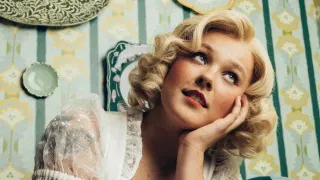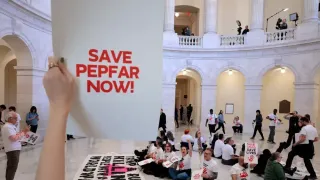February 28, 2014
Dress Red? Or Red Dress? :: Come to the Center's Party!
Kilian Melloy READ TIME: 2 MIN.
If you were asked to name of one of the most successful American theatrical producers, whose productions and tours have grossed over $4.6 billion, reached over 43 million patrons, and is the only producer to have mounted two Pulitzer-Prize winning musicals, that his shows have garnered 22 Tony Awards, including four best-musical awards, would you know who it is?
He also pioneered the concept of ticket lotteries, revolutionizing theater accessibility to make Broadway shows affordable for many, a system now in wide use on the great White Way. Do you know his name? Would mention of “Rent” and “Hamilton,” and that he’s gay, help you guess? If you’re drawing a blank, then you need to read the new candid, fast-moving, and engaging autobiography, “Theater Kid: A Broadway Memoir,” by Jeffrey Seller.
Seller in February pulled “Hamilton’s” run from the Kennedy Center, refusing to allow them to use its profits to support Trump, whom he sees as a misogynistic, racist, ignorant narcissist who admires some of the world’s most violent fascists. He wasn’t going to let anyone coopt his creation, which as we read his memoir, this action is totally in character.
It’s a standard coming-of-age/Horatio Alger rags-to-riches story with Seller saying he wrote it “as an exercise in squashing all my shame at being an adopted (as an infant), gay, Jewish poor kid, and always feeling like an outsider.”
Theater kid used to be an insult, where gays, nerds and other castaway students found refuge with each other and annoyed everyone else. Today, with the popularity of the “Glee” TV series, it’s code word for high octane enthusiasm and the desire to become a star, a singer, an actor. For Seller, it gave him a sense of belonging, that he could fit in, which he never felt as an adopted kid in his quarrelling dysfunctional family. It was both a way out and a way up career for him.
Bookish
The first third of the book, and the least interesting, is Seller’s growing up in suburban Detroit as a shy, bookish child, in a pejoratively named area, Cardboard Village, because of their poorly built houses. The central character in his early life was his father. When he was nine, his father was brain damaged in a motorcycle accident, which left him emotionally unstable.
Sellers would accompany him as he served warrants to people getting divorced, kicked out of their houses, or didn’t pay their bills. Later he studied to be a clown and worked in the Shrine Chorus. Any money his combustible father made would be spent on his own clown costume rather than needed clothes for Jeffrey and his siblings.
Meanwhile, his mother worked several low-paying jobs to support the family, as his father missed car payments, as well as being a philanderer with other women.
“I glowed on the outside, but on the inside, faint feelings of isolation and loss that I could neither define nor voice lay dormant, waiting to express themselves in the future,” Seller writes. To say it was an ambivalent relationship is mild, as at one point he writes, “I hate my fat, smelly, shit-infested, process-serving, brain-damaged father.”
His unhappy life is saved when he watches the 1980 Tony Awards awe-struck at Patti LuPone and Mandy Patinkin singing a song from “Evita.” He saves money to buy the album and memorizes the whole score and lyrics. That year he’s devastated by the death of choreographer Gower Champion hours before the opening of his new musical “42nd Street.”
He joins a youth theater troupe in high school, becoming a producer of sorts convincing its board to put on shows geared more toward good parts for kids. He also works as a drama counselor at a Michigan summer camp in his freshman year at University of Michigan, repeating what became his stock phrase, “Can we do better?” He didn’t realize at the time that this was all training for the producer he would become years later.
Seller was also discovering his sexuality, coming out amid the AIDS epidemic, but still having an active sex life, such as frolicking in a gym sauna with other guys. He spares no details about what kind of sex he likes, but has no serious romantic relationships with other men.
He moved to Manhattan in 1986, beginning his theatrical career as a booking agent, which he hated, but in a bold move, used this position to launch his own producing agency with his business partner Kevin McCollum. His professional turning point comes when he attends a “rock monologue” called “Boho Days” by the 30-year-old neurotic composer Jonathan Larsen, a waiter who wants to write and create a contemporary musical. Larsen and Seller hit it off.
Rent, Heights
Seller encourages Larsen’s idea of taking “La Bohéme” and setting it in the East Village about people living and dying with AIDS. Slowly a revolutionary musical that would change American musical theater forever is formed. Larsen changed Broadway but didn’t live to see the result. This is the apex and longest part of the book. For anyone wanting to create a musical with all its ups and downs, and the importance of artistic perseverance, these chapters are mandatory reading.
Finally, “Rent” is born and right after the final dress rehearsal, heartbreakingly Larsen dies suddenly of an undiagnosed aortic dissection in 1996 just before the opening. Seller fulfills a promise to Larsen to make the show accessible to all theatergoers by introducing the first Broadway rush ticket and lottery ticket policies.
The second fateful evening of his life is when he attends a small theater on 42nd Street where friends from Wesleyan University are developing a new musical called “In the Heights” about Dominican-American characters in Washington Heights in Upper Manhattan. He discovers and befriends the musical’s creator Lin-Manuel Miranda. They develop a professional partnership which will later lead to Seller’s producing Miranda’s masterpiece “Hamilton.” In between his two mega-breakthroughs, Seller will produce the hit musical comedy puppet show with human actors and its racy adult-oriented themes, “Avenue Q.”
These last three musicals are covered in the final 50 pages. I wanted more, especially about his creative relationship with Miranda, though a highlight is his blow-by-blow summary of Vice President-elect Mike Pence’s visit to “Hamilton” after Trump’s election in 2016 and actor Brandon Victor Dixon’s plea for empathy, as one of the first protests of the new regime.
The memoir loses steam in this final section, as it feels rushed. I suspect Seller could write an entire memoir on his accomplishments with Miranda and perhaps that will be his next project.
Seller tells many polished insightful anecdotes, though the book isn’t a love letter to the theater like bisexual director Moss Hart’s classic theater memoir “One Act,” which is its closest antecedent and inspiration for Sellers.
Rather, his message is that theater is hard, demanding work with no guarantees, but persistence is mandatory if you’re going to discover your voice. Seller is honest about the show failures he experienced. But he sees his life’s work as making musicals for his generation. Credit is due about being truthful about himself, that he’s insecure, petty, demanding, but always in pursuit of artistic excellence. He didn’t wait for any doors to open for him. He built his own theatrical empire and helped to transform Broadway into the powerhouse it is today.
‘Theater Kid: A Broadway Memoir’ by Jeffrey Seller, Simon & Schuster, $29.99
https://www.simonandschuster.com/books/Theater-Kid/Jeffrey-Seller/9781668064184
https://www.threads.com/@jseller
Kilian Melloy serves as EDGE Media Network's Associate Arts Editor and Staff Contributor. His professional memberships include the National Lesbian & Gay Journalists Association, the Boston Online Film Critics Association, The Gay and Lesbian Entertainment Critics Association, and the Boston Theater Critics Association's Elliot Norton Awards Committee.






